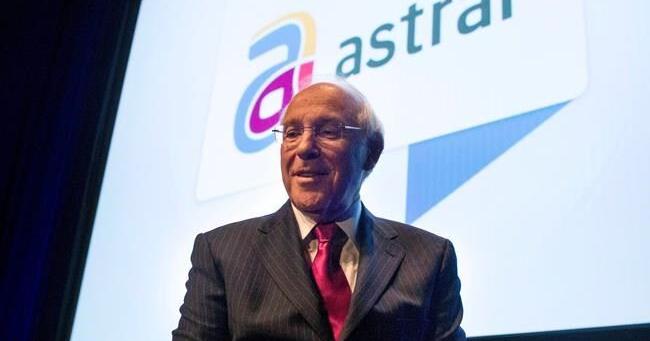Media
Ian Greenberg, media executive and co-founder of Astral, dies at 79 – pentictonherald.ca


TORONTO – Ian Greenberg, the Montreal media mogul who alongside his brothers grew Astral Media into a radio and television powerhouse, has died at 79.
Broadcast giant BCE Inc., where Greenberg served as a board member after the acquisition of his company, said he died Monday. No cause was given.
“Canada has lost a business visionary and media legend, and we at Bell have lost a wise and affable colleague and friend,” BCE chair Gordon Nixon said in a statement.
Greenberg was remembered by friends and colleagues as firmly dedicated to the success of his business and the love of his family, who played a major role in his career. He was eager to mentor those he felt held the skills for success.
“He had such a kind heart,” said film industry veteran Paul Bronfman, who worked under Greenberg at Astral where he affectionately called him “Uncle Ian.”
“He wasn’t a bravado type of guy, pounding on his chest. He let his actions speak for himself and treated his management team just like partners.”
Greenberg was born in Montreal to an Ashkenazi Jewish family of 10 that included his brothers Harold, Harvey and Sidney.
Money was often short and when his mother Ann died suddenly in 1961, the brothers were shouldered with providing for the family.
Several of the Greenbergs worked in a camera store as teens. That experience inspired them to take a $15,000 loan from a close relative and invest it in a film processing business called Angreen Photo Inc., named after their mother.
“They really became a unit and took care of each other,” said Phyllis Yaffe, a longtime media colleague who served on Astral’s board and was once CEO at Alliance Atlantis Communications.
“They were street smart; they were guys who could outwit others.”
The brothers grew their business over the next decade by opening locations inside Miracle Mart department stores. Small acquisitions expanded their investments into motion picture processing, while they secured the exclusive rights to sell photo products at Expo 67.
The Greenbergs aimed for the stars in 1971 when they listed their company Astral Communications Ltd. on the public market.
Within a few years, they were dipping their toes into film and TV production, including the feature, “The Apprenticeship of Duddy Kravitz” starring Richard Dreyfuss in 1974 and “City on Fire,” a Montreal-filmed disaster flick, in 1978.
Those ventures delivered mixed results at best, with their 1982 high school sex comedy “Porky’s” becoming one of the few films to turn a profit. It held the title of highest-grossing Canadian movie at the North American box office for years until 2002’s “My Big Fat Greek Wedding” claimed the crown.
The brothers, willing to recognize when an investment wasn’t working, swiftly exited moviemaking in order to further grow Astral Photo retail stores and tap into the burgeoning world of premium cable television.
As the decade wore on, they collected a slate of valuable pay-TV assets, including English- and French-language movie channels, First Choice (later renamed The Movie Network) Premiere Choix (eventually called Super Écran) and the Family Channel.
When his older brother Harold fell ill in 1995, Ian took over as head of the company, which was in financial turmoil. He brought with him a very different style of leadership: while Harold was known for being hard-nosed and determined, low-key Ian worked behind the scenes.
“It was very easy to dismiss Ian in the early days with his older brother Harold,” said Bronfman.
“But he really came into his own when he became CEO of Astral.”
Greenberg made quick changes, shifting the company’s priorities from photography and video manufacturing to buying radio stations.
Astral Media continued to grow as the country’s largest private radio broadcaster, further bolstered by the acquisition of Standard Broadcasting from the Slaight family in 2007.
In television, Greenberg used his negotiation tactics to secure deals others couldn’t.
One of his big wins was to convince executives at HBO to grow their relationship beyond licensing programming and give Astral the right to launch HBO Canada, a brand that had been sought after by others for years.
“The way that he charmed the HBO guys to let him use that brand in Canada was genius, it was absolute genius,” said Yaffe.
“He went to their weddings, they went to his parties. He really knew how to build relationships.”
When Astral was acquired by BCE in 2013 for $3.38 billion, Greenberg had steered the company to at least 66 consecutive quarters of profitable growth, an astounding feat in the volatile media industry.
“Ian ran his business with a very simple approach: we have to sell more this year than we did last year, and we have to spend less,” Yaffe said.
“And that’s how he grew the business quarter after quarter.”
As part of the BCE purchase, Greenberg assumed a role as director of the company’s board.
He also held a position as chair of Cineplex Inc. where he recently oversaw talks for the Canadian exhibitor’s failed $2.8-billion takeover by U.K.-based movie chain Cineworld, which fell apart amid the COVID-19 pandemic.
“He was a real calming influence,” remembered Ellis Jacob, head of Cineplex.
“And in that way, he was also a great mentor and supporter of our company and me, personally. His steady hand and his focus was really something that I valued.”
This report by The Canadian Press was first published Jan. 11, 2022.
Media
The media industry is dying – but I can still get paid to train AI to replace me – The Guardian


Say what you like about the Germans, you can always count on them to find just the right word for anything. Take “weltschmerz”, for example, which roughly translates to “world pain”. It signifies despair at the suffering in the world – and a deep anguish that stems from knowing that a better world is possible. Is there a more apt encapsulation of the current moment?
For the past six months I, like many others, have been suffering from an acute case of weltschmerz. As someone of Palestinian heritage I have been weighed down by survivor’s guilt as I’ve watched the unfolding genocide in Gaza. For a while, I didn’t have the emotional energy to write. The only way I could get out of bed and make it through the day was by avoiding the news completely. Which … isn’t an ideal scenario when you largely write about the news for a living. So, at one point, I decided on a career pivot and applied for various non-writing jobs, including one at a dog food manufacturer. Reader, I was rejected. In fact, I didn’t even make it to the first round of interviews; I was humbled by a dog’s dinner.
Obviously, I am writing again now. But for practical purposes I keep an eye on what else is out there. The media industry, after all, seems to be in freefall; it’s always good to try to secure a parachute, just in case. And, the other day, one seemed to present itself to me in my LinkedIn messages. According to an automated missive from an AI company, I have the perfect set of skills to help them write the first draft of AI history. I could, the generic message enthused, get “up to $15 [£12] an hour”, to coach an AI model “by assessing the quality of AI-generated writing … and crafting original responses to prompts”.
In other words: I could get paid less than the New York minimum wage to train an AI model to take over my job. Is there a German word to describe that particular situation, I wonder? I’ll have to ask ChatGPT.
Arwa Mahdawi is a Guardian columnist
Media
Social media use increases weight-related bullying risk, study says – Global News
[unable to retrieve full-text content]
Social media use increases weight-related bullying risk, study says Global News





Source link
Media
Georgia’s parliament votes to approve so-called ‘Russian law’ targeting media in first reading – CityNews Kitchener


TBILISI, Georgia (AP) — Georgia’s parliament has voted in the first reading to approve a proposed law that would require media and non-commercial organizations to register as being under foreign influence if they receive more than 20% of their funding from abroad.
Opponents say the proposal would obstruct Georgia’s long-sought prospects of joining the European Union. They denounce it as “the Russian law” because Moscow uses similar legislation to stigmatize independent news media and organizations seen as being at odds with the Kremlin.
“If it is adopted, it will bring Georgia in line with Russia, Kazakhstan and Belarus and those countries where human rights are trampled. It will destroy Georgia’s European path,” said Giorgi Rukhadze, founder of the Georgian Strategic Analysis Center.
Although Georgian President Salome Zourabichvili would veto the law if it is passed by parliament in the third reading, the ruling party can override the veto by collecting 76 votes. Then the parliament speaker can sign it into law.
The bill is nearly identical to a proposal that the governing party was pressured to withdraw last year after large street protests. Police in the capital, Tbilisi, used tear gas Tuesday to break up a large demonstration outside the parliament.
The only change in wording from the previous draft law says non-commercial organizations and news media that receive 20% or more of their funding from overseas would have to register as “pursuing the interests of a foreign power.” The previous draft law said “agents of foreign influence.”
Zaza Bibilashvili with the civil society group Chavchavadze Center called the vote on the law an “existential choice.”
He suggested it would create an Iron Curtain between Georgia and the EU, calling it a way to keep Georgia “in the Russian sphere of influence and away from Europe.”
The Associated Press
-



 Tech20 hours ago
Tech20 hours agoiPhone 15 Pro Desperado Mafia model launched at over ₹6.5 lakh- All details about this luxury iPhone from Caviar – HT Tech
-



 Sports20 hours ago
Sports20 hours agoLululemon unveils Canada's official Olympic kit for the Paris games – National Post
-



 Science23 hours ago
Science23 hours agoAstronomers discover Milky Way's heaviest known black hole – Xinhua
-
News18 hours ago
Toronto airport gold heist: Police announce nine arrests – CP24
-
Media22 hours ago
NPR's liberal bias: Editor exposes media's lack of viewpoint diversity – USA TODAY
-



 Tech18 hours ago
Tech18 hours agoVenerable Video App Plex Emerges As FAST Favorite – Forbes
-



 Science24 hours ago
Science24 hours ago'Almost hit my son' – Space junk crashes through Florida home – BBC.com
-
Investment14 hours ago
Saudi Arabia Highlights Investment Initiatives in Tourism at International Hospitality Investment Forum




